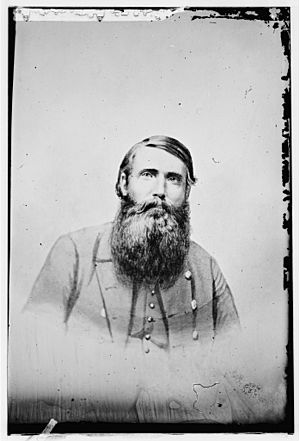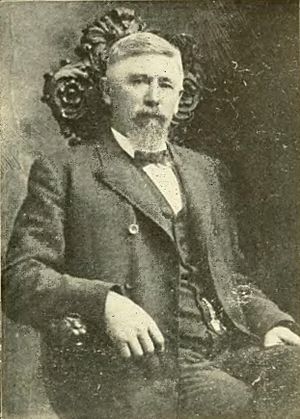McNeill's Rangers facts for kids
Quick facts for kids McNeill's Rangers |
|
|---|---|
| Active | 1862 – May 8, 1865 |
| Country | |
| Allegiance | John Hanson McNeill |
| Branch | Partisan Rangers |
| Type | Partisans |
| Size | 210 men |
| Engagements | American Civil War |
| Disbanded | 1865 |
| Commanders | |
| Notable commanders |
John Hanson McNeill Jesse McNeill |
McNeill's Rangers was a special military group during the American Civil War. They fought for the Confederate States. This group of 210 men was created under a special law called the Partisan Ranger Act in 1862.
The Rangers were formed from parts of other Confederate units. These included Company E of the 18th Virginia Cavalry and the First Virginia Partisan Rangers. Partisan Rangers were like special forces or guerrilla fighters. They operated behind enemy lines.
Even after the Partisan Ranger Act was canceled in 1864, McNeill's Rangers were one of only two such groups allowed to keep fighting. The other was 43rd Battalion Virginia Cavalry (Mosby's Raiders). Both groups operated in the western parts of Virginia and West Virginia.
McNeill's Rangers were known for being very organized during their attacks. However, some Union generals called them "bushwhackers". This was a term for fighters who did not follow regular army rules. These generals believed the Rangers should not be treated as regular prisoners of war if captured.
Contents
The Rangers' Beginning
In 1861, John McNeill, who was from western Virginia, started a military company. He was captured and held in St. Louis. But he escaped the next year and returned to Virginia.
In Richmond, he got permission to form his own special unit. This unit would operate in the western counties of Virginia, which is now West Virginia. On September 5, 1862, McNeill became the captain of this new group. It was officially Company E of the 18th Virginia Cavalry, but everyone knew them as "McNeill's Rangers."
Captain McNeill often led raids on Piedmont and Cumberland, Maryland. His main goal was to stop the Baltimore and Ohio Railroad (B&O) from running smoothly. The B&O was very important for moving Union troops and supplies. It is thought that the Union Army had to use over 25,000 soldiers to guard the B&O because of McNeill's attacks.
Piedmont was a common target because it had important machine shops and many railroad supplies. The main B&O line went through a narrow valley there.
Ranger Operations
1862: Early Skirmishes
In 1862, the Rangers mostly had small, quick fights with Union forces. There are no records of any major battles for them that year.
1863: Growing Stronger
In early 1863, McNeill's Rangers helped other Confederate cavalry units. They scouted for generals like William E. "Grumble" Jones and John D. Imboden. They also helped during a large raid in northwestern Virginia in April and May 1863.
General Robert E. Lee, a famous Confederate leader, praised McNeill. He wrote, "The success of Captain McNeill is very gratifying, and, I hope may be often repeated."
On February 16, the Rangers captured a Union supply train. General Lee again praised their "skill and daring."
On April 6, the Rangers fought the Ringgold Battalion, Pennsylvania Cavalry. They captured twelve men, five wagons, and twenty-five horses.
On June 7, the Rangers raided Hampshire County and took control of Romney.
During the Gettysburg Campaign, the Rangers gathered food and supplies for the Confederate army. They sent back many sheep, cattle, and horses.
On September 11, the Rangers took part in a surprise night attack. They helped capture half of a Union force traveling from Petersburg to Moorefield.
1864: Major Attacks
As the war continued, McNeill's Rangers made bigger impacts. After several tries, McNeill finally succeeded in cutting the B&O railroad. He also burned the machine shops in Piedmont, West Virginia.
On May 5, 1864, the president of the B&O railroad reported the damage. He told the Secretary of War that "the extensive machine and carpenter shops of Piedmont have been burned." He also reported that engines and train cars were destroyed.
Captain McNeill sent his own report to the Confederate Secretary of War. He wrote that they burned "seven large buildings filled with the finest machinery, engines, and railroad cars." They also burned nine railroad engines and many train cars. He added that they captured the mail train and 104 prisoners.
Union General Benjamin F. Kelley was very frustrated by the Rangers' constant raids. On May 22, 1864, he ordered his men to "kill, capture, or drive out" McNeill. But Kelley's men were not enough, and McNeill escaped.
The Rangers also faced local Union supporters. In northern Pendleton County, a group called the "Pendleton Home Guards" often fought the Confederates. On July 19, 1864, the Rangers attacked about 30 Home Guards. The Rangers were pushed back, and their leader, Lieutenant Dolen, was killed.
McNeill's Rangers also helped in the Battle of New Market in May 1864. They slowed down the Union advance. This allowed Confederate General John C. Breckinridge to gather his main forces. The Confederates won a big victory at New Market.
On October 3, 1864, Captain McNeill led about 50 Rangers in a surprise attack. They captured Union soldiers guarding a bridge near Mt. Jackson. The attack was quick, lasting only fifteen minutes. Most of the Union cavalry were captured.
However, Captain McNeill was badly wounded during this raid. He was taken to a house on Rude's Hill. Union General Philip Sheridan later found out who he was. McNeill was secretly moved by Confederates to Harrisonburg, where he died on November 10. His son, Jesse Cunningham McNeill, took over command of the Rangers.
1865: The Final Actions
In January 1865, another Confederate officer, Major Harry Gilmor, came to West Virginia. He planned attacks against the B&O railroad. He used a place called The Willows near Moorefield, West Virginia as his base. McNeill's Rangers used nearby Mill Island and Willow Wall as hospitals.
General Philip Sheridan learned where Gilmor was. On February 4, 1865, a Union scouting party captured Gilmor.
On the night of February 21, 1865, Jesse McNeill led 65 Rangers on a daring mission. They traveled 60 miles behind enemy lines to Cumberland, Maryland. Without being seen, they captured two Union generals, Major General George Crook and Brig. Gen. Benjamin Franklin Kelley, from their beds.
The Rangers escaped the Union soldiers who chased them. They delivered the captured generals to Lieutenant General Jubal A. Early. General Early then sent the prisoners to Richmond. Because of this brave act, Jesse McNeill was promoted to Captain of the Rangers.
General Sheridan later wrote about this event. He said that Jesse McNeill's group "dashed into Cumberland, Maryland... and made a reprisal by carrying off General Crook and General Kelly." He noted that they did their work "so silently and quickly that they escaped without being noticed."
On May 8, 1865, McNeill's Rangers officially surrendered. Their service in the war came to an end.
Images for kids
-
"McNeill, still personating the Ohio captain, said, "I wish that General Grant would remove granny Kelley from Cumberland, and put Crook in command," and in this wish the outpost officer concurred, when Crook laughed audibly and again punched Kelley's leg next to him; and from that time till they got to Richmond, Crook lost no opportunity to poke fun at him."
 | Delilah Pierce |
 | Gordon Parks |
 | Augusta Savage |
 | Charles Ethan Porter |




